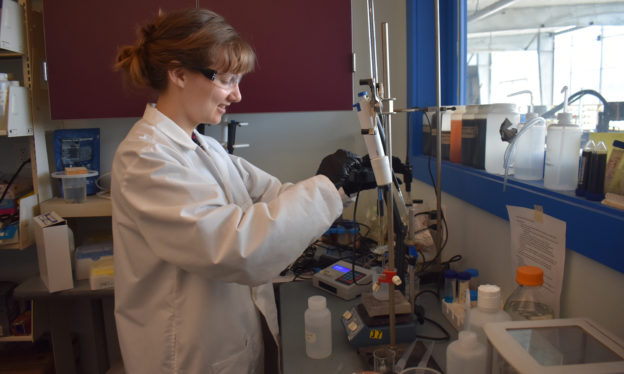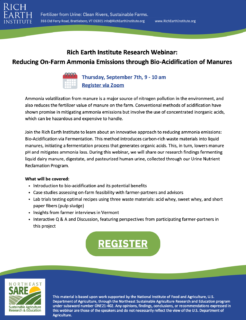Back to all articles
Webinar: Reducing On-Farm Ammonia Loss From Manure through Fermentation Using Whey & Paper Fibers

Thursday, September 7th 9 – 10 am
Ammonia volatilization from manure is a major source of nitrogen pollution in the environment, and also reduces the fertilizer value of manure on the farm. Conventional methods of acidification have shown promise in mitigating ammonia emissions but involve the use of concentrated inorganic acids, which can be hazardous and expensive to handle.
Join the Rich Earth Institute to learn about an innovative approach to reducing ammonia emissions: Bio-Acidification via Fermentation. This method introduces carbon-rich waste materials into liquid manures, initiating a fermentation process that generates organic acids. This, in turn, lowers manure pH and mitigates ammonia loss. During this webinar, we will share our research findings fermenting liquid dairy manure, digestate, and pasteurized human urine, collected through our Urine Nutrient Reclamation Program.
What will be covered:
- Introduction to bio-acidification and its potential benefits
- Case studies assessing on-farm feasibility with farmer-partners and advisors
- Lab trials testing optimal recipes using three waste materials: acid whey, sweet whey, and short paper fibers (pulp sludge)
- Insights from farmer interviews in Vermont
- Interactive Q & A and Discussion, featuring perspectives from participating farmer-partners in this project
Recording:
Note:
This material is based upon work supported by the National Institute of Food and Agriculture, U.S. Department of Agriculture, through the Northeast Sustainable Agriculture Research and Education program under subaward number ONE21-402. Any opinions, findings, conclusions, or recommendations expressed in this webinar are those of the speakers and do not necessarily reflect the view of the U.S. Department of Agriculture.


